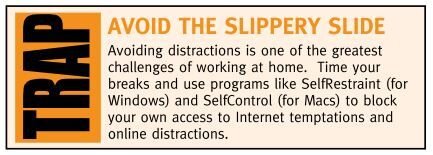Adapting your Business Model to the New Normal
About the Author:
Paul Wilton (editor)
CA with degrees in commerce, accounting and information technology. Paul worked overseas in the “Big 4” accounting firms and served as a director at Audit New Zealand before setting up his own consultancy. Author of A-Z of New Zealand Business Law, Paul has over 20 years of experience as a business owner and consultant. He joined FBA in 2004 and is totally committed to providing excellence in quality and value to our subscribers.
This year, most businesses have had staff working from home. Some have found that this has worked well for them and may be thinking of adopting or adapting this model either fully or partially on a more permanent basis. You would not be alone if this applies to you. The movement towards working remotely is set to continue.
Different models
This does not need to be all or nothing. Hybrid models are becoming more popular where many, but not all employees work remotely with substantial cost savings. Similarly, employees may work from home for much, but not all of the time.
Working from home options work best where:
There is minimal supervision required;
Effective interaction can take place by phone or online with no requirement to be physically present at a business premises; and
The productivity and results of the employee's efforts are able to be measured or are clearly apparent, especially, where remuneration can be linked to outcomes.
The above should be taken into account as you explore different ideas. You should have a pretty good idea now of what could work for your business.
Any change must work both for you and your staff. For each potential candidate, discuss the needs, what worked and didn’t work during lockdown, options to resolve any issues and brainstorm together to determine the best option. Once it seems that you have come up with a model that works, obtain agreement from the employee to trial it for a reasonable period as proof of concept. However, if lockdown has shown that it works and makes sense to go ahead, then do so with your employee’s written agreement.
Unsuitable business types
Some businesses can't be run from home. Factors to consider include:
Council restrictions. Local authorities don't want residential areas transformed by stealth into commercial areas. Nor would neighbours necessarily put up with extra vehicle or foot traffic, parked cars, noise, mess or disturbance.
Tenancy agreements may also impose limitations on the use of rented properties.
Noise creating businesses such as panel beaters and sheet metal workers are not suitable. Nor is any type of business that would lower the tone of the neighbourhood, reducing the value of other residential properties in the area.
Businesses may have special needs, equipment or dependencies that cannot be met from home (plant, production lines, laboratories, operating rooms, teamwork, storage of dangerous goods or chemicals and so on).
Retail businesses and others that attract a lot of customers to a showroom or outlet are likely to be unsuitable or prohibited.
Some businesses need to project an upmarket, professional image or enhance their market credibility and have regular meetings with suppliers, clients or customers.
Some restrictions may be managed by renting space as required for different purposes. Examples include storage, training facilities or a serviced suite of offices, where you get a reception desk, waiting area and use of a meeting room. These typically provide shared business equipment such as projectors and conference facilities that are not cost-effective investments for the average home office.
Benefits of working at home
No commuting, saving time and transport costs, while reducing stress.
Instant access to your office. No worries about leaving something at work.
Low overheads, particularly rent.
The business can share some of the costs of running your home, such as telephone, rates and electricity expenses.
You can wear what you like in your own office and save on business clothing.
Many home offices offer more tranquil work environments than industrial or commercial areas.
Technology is making it ever easier for you to operate effectively from home or elsewhere, permitting ever more mobility - office in a car.
You can choose your own hours. For instance, some people prefer working late at night, when the rest of the household is asleep.
Drawbacks and pitfalls
Your office is always with you.
The office space might be inadequate. Poor fit-outs and space problems characterise many home offices. Not everyone can dedicate a room to business or have a separate entrance.
Health and safety responsibilities may be harder to fulfil when you do not have control of the work environment of an employee.
It can be difficult to maintain focus, motivation and disciplined work routines.
Feeling isolated, missing collegial support and brainstorming, resulting in lower motivation and a loss of work discipline.
Fostering a sense of organisational identity and loyalty may need special attention.
The advantage of being close to your children can be offset by the disadvantage of the interruptions. Friends and other family members also need to know that your being at home does not mean they can pop in any time for coffee.
Being a great role model
The consolation of being interrupted by your children is that you have an opportunity to be a great role model to them. They grow up witnessing you as a self-reliant, self-employed business person, growing and developing a business that feeds the family. What better preparation could there be for their own future as possible entrepreneurs? Many parents successfully draw their children into the business as they get older, letting them share business tasks of increasing responsibility.
Being isolated
People used to busy offices can find it harder to maintain motivation and work discipline. Strategies to keep you motivated include:
Getting out of your home office – schedule face-to-face visits with customers and suppliers, or regular breaks to go for a walk and clear your head;
Networking – join groups with shared interests, from your local Chamber of Commerce to professional associations.
For businesses with several employees, it is a good idea to provide opportunities for staff to get together, whether you retain a central office or not, especially if collegial support plays a role or where there are work dependencies. It is also helpful to have backup options to cater for times when home circumstances interfere with work obligations.
Is there a tax advantage?
The business may deduct expenses associated with an employee working from home. The employee cannot deduct the expense, but if the employer pays a home allowance, that will be deductible to the business and There is no difference in principle between deductions available to home office businesses and those available to businesses in conventional offices. Nonetheless, the ability to deduct some costs of working from home can help. In brief, you can deduct all expenses directly related to generating your business income.
Your accountant will be able to give you more detailed advice about how and what you can deduct as legitimate home office expenses.
Insurance tip
Speak to your insurance broker or agent about possible insurance changes or extra cover on office equipment used at home. Home contents type insurance policies often don't cover equipment used for business purposes.
Conclusion: reward yourself!
Many businesses can benefit from the reduced overheads of owners and employees working from their own homes.
Succeeding in a home office does, however, take some extra discipline and adaptation. Consider the extent to which you need to keep your neighbours informed of what you are doing to maintain good relations.
For businesses with several people working from their own homes, attention should be given to the need from time to time to bring employees together for sharing of strategy and ideas, reviews, face-to-face meetings where necessary, training and so forth.
Recognise that you're part of a fine tradition, as well as moving with the times as more businesses achieve a competitive advantage from home-based productivity.
Successful multinational corporations have been started in suburban garages: Apple Computers and Hewlett-Packard are just two examples. If your business grows or changes, you too may have to move someday. For those who do manage to work from home, enjoy the benefits and remember to reward yourself regularly for your achievements.
Adapted with permission from an article published by the ANZ Bank. The original article may be found here.













Deploying siloed tactics does not equate to purpose-driven strategy. This is as true in purpose-driven strategy as any other. While there is potential to deliver social impact this way, it can slip easily into “special projects” that organisations do on the side and the public is savvy in recognising authenticity.